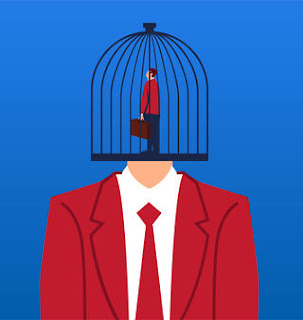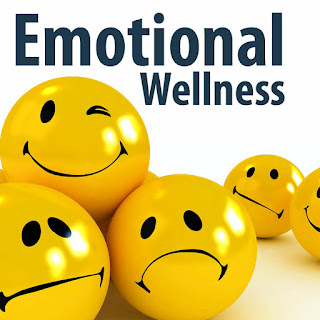When confronted with crisis, there are 2 possible approaches we can adopt - 1. Reactive, and 2. Proactive, though many of us find ourselves stuck between the two extremes of the continuum. A reactive approach is built mainly on the element of passivity, which is characterised by a "wait and watch" mindset/ attitude, with occasional reactions to things,but clearly not displaying any intent to resist or respond to the unfavourable status-quo. There's no attempt or effort to move out of comfort zone. On the other hand, though the Proactive approach is also about accepting the status-quo but then there is an effort to prepare (oneself) for post-crisis scenario. Getting fully versed with the prevailing situation and preparing oneself to deal with future challenges (some anticipated and some otherwise) is what entails the proactive approach during crisis.
When "writing is on the wall" and a "paradigm shift" is inevitable, then it's wise to adopt a "proactive" approach and prepare oneself for the anticipated changes. Given the magnitude of the current crisis, one could say that we are at the cusp of a major (macro) revision in our lives, and soon, we all, would be catapulted to Life 2.0. Whether we like it or not, there's a new "normal" that awaits us in future, post-crisis. What's most scary about this situation is the fact that the transition from Life 1.0 to Life 2.0 is not going to be as smooth as we would have wanted it to be because of the fact that we have been caught off-guard by this calamity.
The 180 degree turn that our lives have taken has necessitated us to take a broader view of things while gearing up for Life 2.0. This "paradigm shift" is going to give rise to a new "normal" and the sooner we become aware of it, the better equipped we will be to deal with it and manage our lives better. A holistic understanding of the changes that may sweep our lives could be a starting point to gear up for Life 2.0. Let's look at some aspects of our life that are bound to get impacted immensely
- Lifestyle - the free flowing nature of the way that we are accustomed to living (till yet) will take a bad hit. The careless and, at times, callous attitude would get replaced with a more mindful attitude. For a major part of the next few years, we may find ourselves operating at the bottom of "Maslow's Hierarchy of Needs". Luxurious Living will become a passe and we will let go of need to be overly materialistic. Instead we will tend to adopt Minimalism or Essentialism as the preferred way of life. (For all those, who may not know about Essentialism and Minimalism - these are concepts which promote living a life only with the minimum or essential of needs, only with that much as is needed to live/ sustain). Life 2.0 will see a lifestyle (hopefully), bereft of any brandishing of our status or achievement.
 |
| Maslow's Hierarchy of Needs |
- Work - The dynamics of the workplace and the way we transact at work will see a drastic change. The organisations are going to tread slowly on investment and manpower. The job/ job role may not be an assurance or something that we may take for granted and rather may give way to maintaining a balance between our aspirations and needs. Life 2.0 may see us leveraging technology to hilt, as the work trend will see a shift to "virtual". The new mode of working give rise to a different set of professional skills, ethics and etiquette (rather netiquettes). For Work, Life 2.0 will throw open challenges related to transacting, teamwork, accountability and productivity and we need to focus on addressing them before going full throttle in Life 2.0.
- Relationships - The need for developing and maintaining a support system, comprising of our family and close friends will take precedence over the need for expanding our network incessantly. These difficult time have taught us the importance of real connections, family and friends, whom we can fall back on, during times of difficulty. However large our social/ virtual network may be but it can't make up for a few trustworthy comrades and family members, who could be our source of strength always.
- Goals & Priorities - The ambitions may not top the list of our goals and instead may give way to stability. Having witnessed the VUCA (Volatile, Uncertain, Complex, Ambiguous) nature in action, the priorities may shift in favour of safety, security and health. From a goals-perspective, we will find ourselves taking recourse to setting only short-term goals for the identified priorities. We may find ourselves creating Plan B and Plan C.
- Living - During Life 2.0, there is bound to be a major shift in our perception and perspective about life and happiness. The stark realisation that life is so ephemeral (in context of a crisis) has only made us value it more, in the truest sense, in terms of all the cherishable moments and relationships. It has also made us realise that life is a gift and we should live all our dreams, before it is too late. The crisis has opened us up to the real meaning of happiness and that is in displaying gratitude, compassion and empathy. Life 2.0 will be more about WE than ME and we can hope to turn out to be better humans, living with the feeling of togetherness and camaraderie.
Ending this post with a couple of quotes on "Paradigm Shifts" that will help us get started smoothly on our Life 2.0 journey
"Paradigm shifts aren't always obvious when you are in the middle of one" - Michael Brune
"A paradigm shift is a revolutionary change from one way of thinking to another; a transformation or metamorphosis, rather than an evolutionary process. The paradigm we use and accept is dependent on us believing what we perceive to be true and accurate" - Unknown
Let Life 2.0 begin !















































